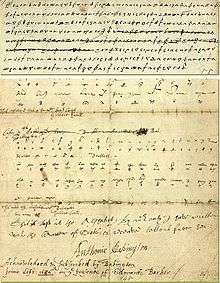Thomas Phelippes

Thomas Phelippes (1556–1625), also known as Thomas Phillips, was a forger and intelligence gatherer. He served mainly under Sir Francis Walsingham, in the time of Elizabeth I, deciphering the codes of those plotting against her.
Babington Plot
He is most remembered for his postscript to the "bloody letter" sent by Mary, Queen of Scots, to Anthony Babington regarding the Babington plot. When he sent Walsingham the letter proving Mary, Queen of Scots's complicity in the plot Phelippes had drawn a gallows on the envelope. This scene is recreated in the 2006 TV miniseries The Virgin Queen, starring Anne-Marie Duff as Elizabeth I, and Vincent Franklin as Phelippes. According to historian Neville Williams,[1] the notes were smuggled to Mary via empty barrels from a brewer in Burton upon Trent who supplied the house at Chartley Manor where she was being held prisoner in the custody of Sir Amias Paulet. Neale gives this description of him, '‘a small, lean, yellow-haired, short-sighted man, with pock-marked face, an excellent linguist, and, above all, a person with a positive genius for deciphering letters.’[2] Phelippes was kept busy with a backlog of correspondence requested by Her Majesty whose letters contained day to day matters as well as those of a more sensitive type. Walsingham had to wait a whole seven months before he got what he wanted. This postscript asked Babington for the names of the plotters involved in the planned assassination of Queen Elizabeth I, and hence Francis Walsingham was able to prove Mary's direct involvement in the plot, and have her executed.
References
Further reading
- The codebreakers, the comprehensive history of secret communication from ancient times to the internet (revised and updated 1996) – David Kahn ISBN 0-684-83130-9
- Cryptology and statecraft in the Dutch Republic – Karl de Leeuw ISBN 90-5776-039-8
- Spies & spymasters, a concise history of intelligence – Jock Haswell ISBN 0-500-01178-8
- The Watchers, a secret history of the reign of Elizabeth I – Stephen Alford ISBN 978-0-141-04365-4